Your major expense or emergency fund should be enough to cover your major expenses for six months to a year. Here are some important expenses to consider when determining how much you save
- Housing expenses: Your emergency fund should include savings for housing expenses such as rent or mortgage, property tax, insurance, and utilities. Protecting the value and integrity of your home is of utmost importance, so it’s a good idea to also include savings for emergency home repairs.
- Food: Estimate your monthly food expenses and include those costs in your emergency fund savings. You can build these savings and reduce your food expenses by cutting back on dining out at restaurants, building your shopping list around sale items, and using coupons from your local newspaper.
- Health care: Factor in the monthly cost of medical and dental insurance. In the event that you’re laid off, you may be eligible to stay on your former employer’s health plan for up to 18 months at your own expense through the Consolidated Omnibus Budget Reconciliation Act (COBRA).
- Debt repayment: Your monthly payments for credit cards and other debt should be factored into how much you save for an emergency fund in order to protect your credit score. Take steps now to get out of debt to avoid the stress of dealing with these expenses if you become unemployed or face a financial challenge.
- Transportation: If you have a vehicle, your emergency savings should cover necessary costs such as your car loan, insurance, basic maintenance, fuel, and emergency repairs.
- Personal expenses: Costs related to household supplies, haircuts, clothes, and toiletries may seem generally inexpensive, but these expenses can add up. Remember to include these items, as well as life and disability insurance, when planning for how much you should save for an emergency fund.





